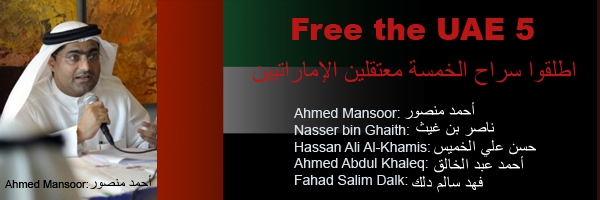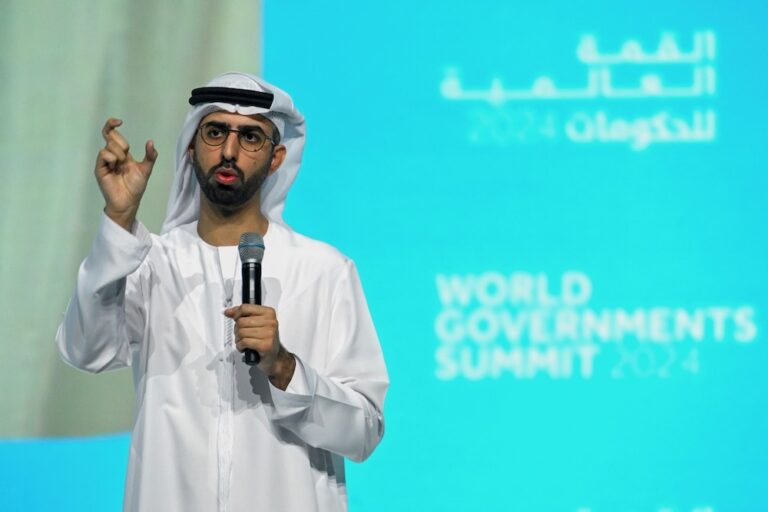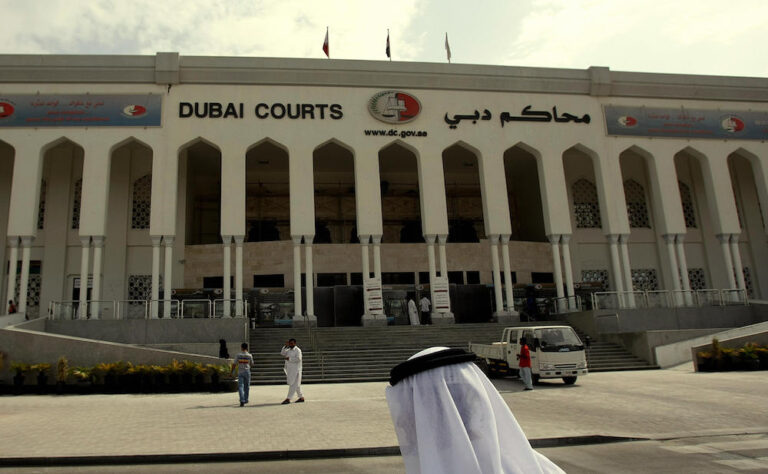International rights groups seek to monitor trial of 5 activists during 26 September trial appearance.
(Human Rights Watch/ANHRI/IFEX) – Dubai, September 22, 2011 – Emirati authorities should immediately drop all charges against five activists imprisoned after calling for greater political rights and freedoms and free them ahead of national elections on September 24, 2011, four international human rights organizations said today. Amnesty International, the Arabic Network for Human Rights Information (ANHRI), Front Line Defenders, and Human Rights Watch have requested permission to attend the trial of the five if it resumes as scheduled on September 26 in Abu Dhabi’s Federal Supreme Court.
The renewed call to free the activists comes five months after authorities arrested them and later charged them with “publicly insulting” the United Arab Emirates president and other top officials.
“These activists remain in jail and on trial solely for peacefully expressing their political views and calling for greater democratic freedoms,” said Sarah Leah Whitson, Middle East director at Human Rights Watch. “Continuing this sham trial two days after elections undermines any claim that UAE authorities really want to expand political participation in the country.”
The four rights groups have asked the authorities to allow two independent legal observers to monitor the closed hearings. The authorities have not yet responded to the request.
“It’s not enough that people can go out and vote,” added Rawda Ahmed, deputy executive director of ANHRI. “They must be free to have a say in the political process without fear of being jailed.”
The five activists, whose trial opened on June 14, are: Ahmed Mansoor, an engineer and blogger who is also a member of Human Rights Watch’s Middle East advisory committee and of ANHRI’s network; Nasser bin Ghaith, an economist, university lecturer, and advocate of political reform; and online activists Fahad Salim Dalk, Ahmed Abdul-Khaleq, and Hassan Ali al-Khamis.
The five are charged under article 176 of the Penal Code, which makes it a crime to publicly insult top officials. Mansoor and bin Ghaith are also accused of having used the online political forum UAE Hewar to “conspire against the safety and security of the State in association with foreign powers.”
The rights groups said that the government has presented no legitimate evidence to support these allegations.
None of the messages allegedly posted by the accused to the now banned UAE Hewar site do more than criticize government policy or political leaders, said the four human rights groups, which have reviewed the posts. There is no evidence that the men used or incited violence in the course of their political activities.
“The comments for which these men are being tried do not constitute an internationally recognizable criminal offence, yet they are being tried behind closed doors in a court from which there is no right to appeal,” said Malcolm Smart, Middle East and North Africa director at Amnesty International. “UAE authorities should end this travesty of justice and release the five now and unconditionally.”
Mansoor faces additional charges of inciting others to break the law, calling for an election boycott, and calling for demonstrations. In March, shortly before his arrest, he publicly supported a petition signed by more than 130 people advocating universal, direct elections for the Federal National Council (FNC), a government advisory board, and to give the body legislative powers.
Since his arrest, UAE authorities have increased the number of eligible voters for the FNC elections to 129,000, from about 7,000 in the previous election in 2006. Voters will choose only 20 of the 40 FNC seats; the rulers of the seven emirates appoint the other half.
Reports suggest that in trial sessions held to date, the Supreme Court has not allowed defense lawyers to question one of the four state witnesses and allocated insufficient time to question the other three. According to a letter smuggled out of prison in late August and signed by four of the activists, the activists said that procedural flaws have led them to be “certain that we have not and will not obtain a fair trial, which every defendant deserves.” In the letter, the activists demanded that the court cease trying them in secret and allow observers and citizens to attend the hearings. They also urged the court to release them on bail, allow them to review the charge sheet against them, and allow their lawyers to do their job in court and question prosecution witnesses.
After the letter’s release, bin Ghaith, one of the signatories, complained that prison authorities encouraged inmates to harass him. After an altercation with another prisoner, prison authorities chained him in solitary confinement in a cell without air conditioning despite the 40-degree heat.
“Regardless of their innocence or guilt, prison authorities have a duty to protect the activists and not abuse them,” said Andrew Anderson, deputy director of Front Line Defenders. “The alleged ill-treatment of bin Ghaith is unacceptable and should be thoroughly investigated, with those responsible held to account.”
FOR MORE INFORMATION, PLEASE CONTACT:
For Human Rights Watch, in Dubai, Samer Muscati (English): +971-509237654; or muscats@hrw.org
For Amnesty International, in London, the press office: +44-20-7413-5566; or james.lynch@amnesty.org
For the Arabic Network for Human Rights Information, in Cairo, the press office: +20-223964058; or rawdaahmed@anhri.net
For Front Line Defenders, in Dublin, Jim Loughran: +353-1-212-3750; or jim@frontlinedefenders.org
BACKGROUND
In the UAE, the penal code allows the government to jail people simply for expressing their peaceful views, in contravention of clear international human rights guarantees of free speech. Article 176 of the penal code permits a sentence of up to five years in prison for “whoever publicly insults the State President, its flag or national emblem.” Article 8 of the code widens the application of the provision to include the vice president, members of the Supreme Council of the Federation, and others.
Freedom of speech is guaranteed under the UAE’s constitution and is well established under international human rights law. The International Covenant on Civil and Political Rights (ICCPR) holds that “everyone shall have the right to freedom of expression. . . to seek, receive and impart information and ideas of all kinds.” While the UAE is not a party to the ICCPR, it constitutes an authoritative source and guideline reflecting international best practice. Accepted international standards only allow content-based restrictions in extremely narrow circumstances, such as cases of slander or libel against private individuals or speech that threatens national security.
Article 32 of the Arab Charter on Human Rights, which has been ratified by the UAE, guarantees the right to freedom of opinion and expression, and to impart news to others by any means. The only restrictions allowed on the practice of this right are those imposed for “respect for the rights of others, their reputation, or the protection of national security, public order, public health, or public morals.” Article 13(2) of the Charter also requires that hearings be “public other than (except) in exceptional cases where the interests of justice so require in a democratic society which respects freedom and human rights.”
The United Nations Declaration on Human Rights Defenders provides that countries should “take all necessary measures to ensure the protection of everyone against any violence, threats, retaliation, adverse discrimination, pressure or any other arbitrary action” as a result of their participation in human rights activity.
Amnesty International
Front Line Defenders



